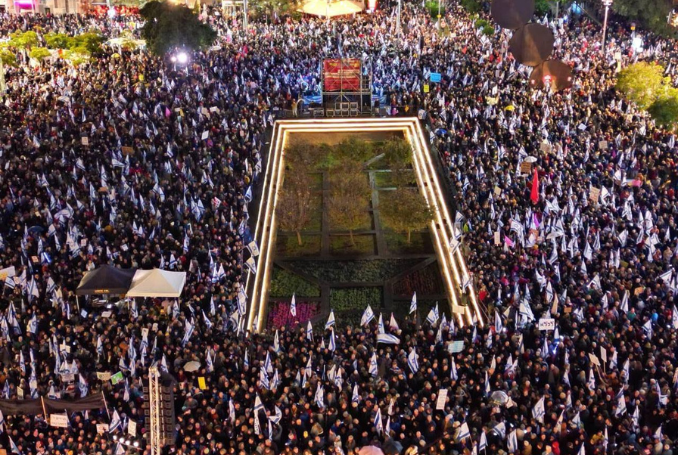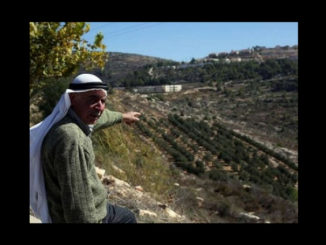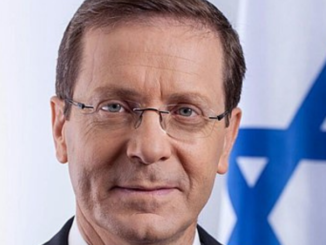
By Benay Blend
Shortly after Israel’s recent elections, tens of thousands of Israelis took to the street to protest the new government. Discontent focused on the government’s plan to weaken the Supreme Court which Netanyahu claims holds too much power over political decisions. Demonstrators carried Israeli flags while chanting “No to Dictatorship” and “Democracy.” Only a few mentioned the Occupation.
According to Yara Hawari, just as Israel has never been a democracy for all, its Supreme Court rulings have provided a “legal veneer” for the Zionist regime’s “crimes against the Palestinian people.” As Hawari writes, all Israeli governments have been stained with the blood of Palestinians, and Israel has always been a “democracy” only for the few. Illustrating her point, when a small number of anti-Zionists showed up carrying Palestinian flags, they were quickly “pulled down” by “fellow ‘pro-democracy’” protestors.
Dania Shwartz from Ramat Gan told AFP reporters that the crowds were taking back the Israeli flag. “If you look around, there’s a lot of Israeli flags and for many years the Israeli flag was a symbol of the right,” she said. “We are patriots and we want this country to keep existing. The Israeli flag belongs to all of us – this is not a question of being right or left.” She also expressed concern as a member of the LGBTQ community that the new government would pass laws that would affect her children.
Every time Israelis join protests against the government several of my friends ask me what I think about the demonstrations, like any discontent against the Zionist government is bound to be a good thing. No, it isn’t. Among the signs and comments to the press, there is little to no mention of Palestinian rights in this so-called democracy. The Israeli flag certainly does not “belong to all of us,” as it does not include Palestinians.
In an excellent article by Marion Kawas, these points are clear. It appears that “the anti-government demonstrations happening right now in Israel are not pro-Palestinian or even pro-democracy,” she writes,“Palestinian flags are being ripped down not just by police, but also by other protestors.”
There is a growing movement among Palestinian youth, Kawas continues, to privilege all forms of resistance over appealing to the “world’s conscience”; therefore, now is the “time to stand against Zionism clearly and publicly, both as an ideology and as a settler-colonial project. Anything less is a betrayal of Palestine and its people.”
In “The International Struggle on Behalf of Palestine” (Our Vision for Palestine: Engaged Palestinian Leaders and Intellectuals Speak Out, 2022, Eds. Ramzy Baroud and Ilan Pappé, p. 402), Ilan Pappé writes about what solidarity really means. “What it boils down to,” he explains, “is a full understanding that you have to listen to liberation movements and the colonized people,” thereby learning “why they need from you and not preach to them what they should do.”
These lessons are particularly important today for, as Marion Kawas writes, the Palestine solidarity movement is “entering a critical phase,” as “liberal Zionists and institutions desperately try to distance themselves from the new Israeli government.” In response, some Western governments are “ramp[ing] up their rhetoric on Palestinian rights” and the defunct two-state solution. Nevertheless, she concludes, it’s important to be “vigilant as to the limits and motives of such support.”
In an article examining why “The Palestinian Solidarity Movement Should Focus on Palestine,” activist/journalist Dr. Ramzy Baroud contends that “the Palestinian memory is rarely the center of discussion, which has been centered, for nearly 25 years, around the futile language of a ‘peace process’, ‘painful compromises’, ‘land for peace formula’ and the “two-state solution’ that was never intended to solve anything in the first place.”
Context matters. Much like Kawas’s warning to be wary of Israeli protesters who ignore the rights of Palestinians, Jews of color, and other marginalized groups, there is a long history in this country of the far right’s efforts to coopt anti-war, anti-racist and other movements who have views different than their own.
For example, on February 6, 2021, Black Lives Matter co-founder Alicia Garza announced that she was pulling out of a World Values Network online gala with Rabbi Shmuley Boteach, a prominent American Zionist. in the aftermath of the Black Lives Matter movement’s 2014 platform that denounced the US government’s military aid to Israel, there were claims of “one-sided” and “unfair” from pro-Israel commentators who rejected the coalition’s critique. Eventually, members of various anti-colonial movements convinced Garza not to be drawn in by Shmuley’s efforts to break the Black movements’ historic ties with Palestine.
More recently, the far-right has set another trap for the anti-war movement in the States. The event in question, “Rage Against the War Machine,” planned for Feb. 19, in Washington, D.C. is portrayed as a left/right alliance against the U.S. proxy war in Ukraine. As Melinda Butterfield observes, however, the program
“features racist, anti-trans, and anti-worker speakers like “Tea Party” founder Ron Paul, a former member of Congress from Texas; anti-trans bigot Tulsi Gabbard, another former representative; former judge Andrew Napolitano, a past Fox News host who was considered by Trump for a Supreme Court seat; and representatives of the Libertarian Party and Lyndon Larouche’s Schiller Institute.”
This cast of characters is balanced by very few speakers from the left, the most prominent being Jimmy Dore, a YouTube personality known for appearing with “arch-bigots” Tucker Carlson and Joe Rogan. “The ultra-right is preying on the weakness and confusion that has plagued the anti-war movement since the outbreak of open conflict between Russia and NATO’s proxy regime in Ukraine last year,” Butterfield explains. “In this, the far right is attempting to lead anti-war forces into a trap that would override the life-and-death concerns of oppressed communities for the false hope of a ‘broad’ alliance” against the warnings of World War III.
In so doing, she concludes, its ultimate goal is to strengthen its own “openly fascist, white supremacist” agenda, based on “anti-trans panic, hatred of migrants and refugees, censorship of Black and LGBTQ+ history, robbing women of their right to abortion, and so on.”
Activist/journalist Jacqueline Luqman reiterates these points. Labeling the rally “#AntiWarSoWhite,” Luqman calls attention to the Libertarian Party, one of the key organizers of the event, and its take-over by the Mises Caucus, citing some of the messages of their members. “Amazing how allegedly freedom-loving Libertarians sound hauntingly like rights-stripping bigoted Republicans.”
“We cannot afford to lend those groups legitimacy now,” Luqman concludes, “only so they can win the power to use it against us later. It is a grave betrayal of our humanity to demand that we do.” This statement sums up one of the major reasons why context matters, along with other issues like imperialism, racism, and reallocating money spent on war to the people’s needs at home.
During the Vietnam War, the focus for many was ending the war, and so all of the other matters that were associated with the war were ignored. When the conflict ended, all of the other issues remained. In fact, the right gained power in a backlash that ended with the election of Ronald Reagan.
If the anti-war movement doesn’t encompass a broad agenda, if it favors alliances with the far right instead of with people who, Luqman says, force them to have “conversations about their racism and white supremacist tendencies, their patriarchy, their homophobia and transphobia, their ableism, their superior attitude as if they know All Things Organizing, and their resistance to being led by nonwhite non-men,” then, again, there will be little substantive change when the war is over.
As for Palestine, the same prescription holds. Instead of writing against the Zionist agenda, activists must realign their script to place Palestinian interests at the center. If they fail to do so, they will have contributed very little to the cause.

– Benay Blend earned her doctorate in American Studies from the University of New Mexico. Her scholarly works include Douglas Vakoch and Sam Mickey, Eds. (2017), “’Neither Homeland Nor Exile are Words’: ‘Situated Knowledge’ in the Works of Palestinian and Native American Writers”. She contributed this article to The Palestine Chronicle.







